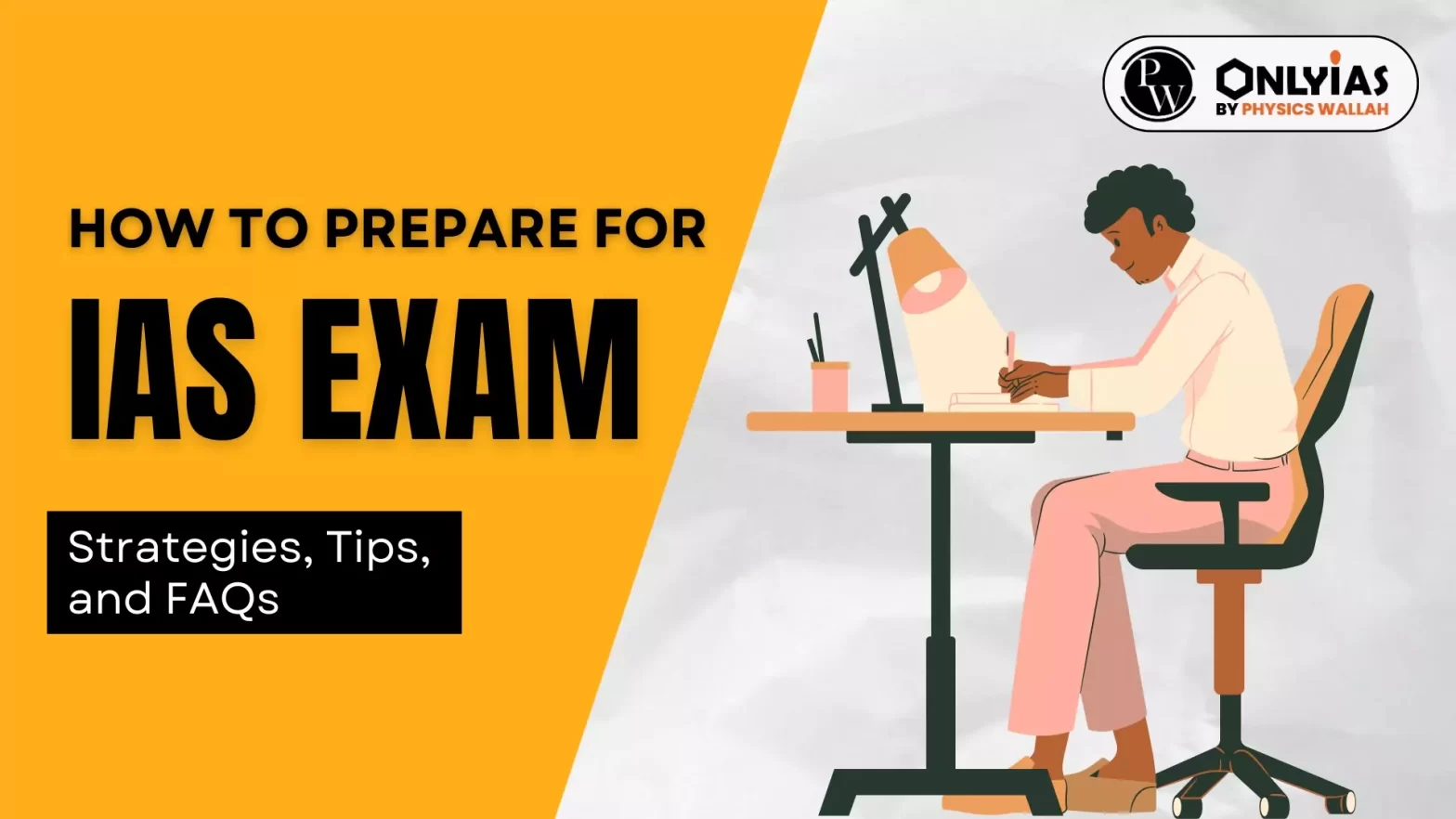![]() PWOnlyIAS
PWOnlyIAS
![]() March 22, 2024 06:21
March 22, 2024 06:21
![]() 770
770
![]() 0
0
Prepare for the IAS exam efficiently with strategic tips, subject-wise guidance, and FAQs. Get ready to embark on your journey to become an IAS officer.

Preparing for the IAS exam requires a smart plan covering everything from the first stage to the last interview. This article explains the important things to do, how to study each subject, and answers common questions to help people who want to become an IAS officer. It’s like a road map to reach the destination of becoming an IAS officer.
IAS is one of the most sought-after careers currently in India. Because of the rising exposure to the internet and social media, IAS has found a place among the top career choices for students. While the IAS dream has found popularity, students overwhelmingly face a major roadblock in achieving their dream—the question of “How to Prepare for IAS?”. While there are no set rules for preparing for IAS, this article may give you some insights into the world of IAS exam.
The IAS Exam is not a simple graduate-level examination involving a fixed subject and repeated concepts. It is a competitive exam that requires a candidate to have the right aptitude and wide knowledge base. Hence, a candidate needs to plan his/her preparation in such a way that it covers all the basic subjects, along with clarity on core concepts. Before knowing how to prepare for IAS, a candidate needs to divide his/her preparation into stages. These stages overlap with the exam stages viz Prelims, Mains and Interview.
IAS Prelims is a screening test that is conducted to filter the majority of applicants for the UPSC Examination. Hence, the score of the prelims exam is not considered for the final merit list. The prelims exam consists of two papers: GS Paper 1 and CSAT. The GS Paper 1 is the main paper whose score determines if a candidate qualifies for UPSC Mains. The CSAT is qualifying in nature. A candidate has to score 33% of the marks in CSAT along with a cut-off score in GS Paper-1 to qualify for UPSC Mains.
Strategy for GS Paper-1 |
Strategy for CSAT |
|
|
IAS Mains Exam is completely different from prelims while considering the approach needed to clear the exam. While prelims focuses on knowledge and analytical abilities, mains puts emphasis on the descriptive nature of a candidate’s thoughts. Candidates who possess the ability to present information and thoughts in a concise manner succeed in the examination.
The mains preparation can be done by keeping following instruction in mind:
Score in an optional subject is the difference between a successful and an unsuccessful candidate. This is the reason why optional subjects need a separate strategy and planning. Candidates can use following strategy to tackle optional subjects:
Before talking about the approach to prepare for the IAS interview, one has to know that it is a test of personality rather than a test of knowledge. The commission has already tested the knowledge of the candidate through prelims and mains exam, and hence now wishes to know whether the candidate is fit to serve as a civil servant.
In short, along with developing knowledge, a candidate has to develop his/her personality. The candidates’ mannerisms, body language, the approach to the challenge and also ability to convey his/her thoughts lucidly are of vital importance.
Following are some of the ways to prepare for the interview:
Beginners always face the difficulty of how to go about their preparation. Some of the ways in which a beginner can optimise his/her preparation is as follows:
The IAS Exam is based on four pillars: Knowledge, Consistency, Guidance and Motivation. If a candidate can access all these vital pillars without attending a coaching, one can prepare without it. However, if the candidate feels that he/she lacks certain aspects, they can always join a value-addition course. If a candidate does not know anything about the exam but still wants to attempt it, it is advisable to join a coaching institute for their foundational knowledge. The core strategy for preparing for IAS, with or without coaching remains the same provided the candidate has access to all the basic materials.
Coaching provides the following Advantages for a candidate preparing for the IAS Exam:
The IAS exam requires extensive knowledge and clarity of concepts. This is the reason why candidates have doubts when it comes to selecting the books for preparation. Following are some of the core books that are vital for IAS Preparation.
| Subject | Books |
| Polity |
|
| History |
|
| Geography |
|
| Environment and Ecology |
|
| Disaster management |
|
| Internal Security |
|
| International Relation |
|
| Science and Technology |
|
| Ethics |
|
| Economy |
|
| Art and Culture |
|
The method of preparation from home is not different from preparing from IAS coaching hubs such as Delhi, Hyderabad, Patna or Chennai. However, what makes the difference is the approach of the candidate. If a candidate prepares from home regularly with dedication and proper planning with resources, without distractions, his/her chances of qualifying the exam are the same as a candidate preparing from coaching hubs. Similarly, a candidate preparing from a coaching hub, undergoing all sorts of distractions, is likely to fail. Hence, the place of preparation does not matter as long as you have the best of the materials and a person to guide you. If you are a person looking for a motivated environment to study, IAS coaching hubs may be the right choice.
Many candidates opt to prepare for the exams along with their regular/part-time job. In such a condition, it is necessary that the candidate utilises his/her time effectively to prepare for the exam. Before beginning a candidate has to know his/her preparation level so that they can prepare accordingly. Candidates preparing along with a job can adopt the following strategies:
Approach to IAS Exam should not be one dimensional, rather it must be dynamic and multi-faceted. Hence, candidates must focus on the core of preparation, which is syllabus understanding, syllabus completion, current affairs update, regular revision and regular testing. Candidates fulfilling all these requirements have a high chance of qualifying the exam.
| Must Read | |
| NCERT Notes For UPSC | UPSC Daily Current Affairs |
| UPSC Blogs | UPSC Daily Editorials |
| Daily Current Affairs Quiz | Daily Main Answer Writing |
| UPSC Mains Previous Year Papers | UPSC Test Series 2024 |
<div class="new-fform">
</div>

Latest Comments